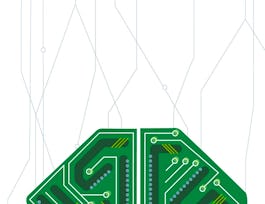This online course covers basic algorithmic techniques and ideas for computational problems arising frequently in practical applications: sorting and searching, divide and conquer, greedy algorithms, dynamic programming. We will learn a lot of theory: how to sort data and how it helps for searching; how to break a large problem into pieces and solve them recursively; when it makes sense to proceed greedily; how dynamic programming is used in genomic studies. You will practice solving computational problems, designing new algorithms, and implementing solutions efficiently (so that they run in less than a second).


Algorithmic Toolbox
This course is part of Data Structures and Algorithms Specialization
Taught in English
Some content may not be translated



Instructors: Neil Rhodes
511,036 already enrolled
Included with 
Course
(12,356 reviews)
91%
What you'll learn
Essential algorithmic techniques
Design efficient algorithms
Practice solving algorithmic interview problems
Implement efficient and reliable solutions
Details to know

Add to your LinkedIn profile
25 quizzes
Course
(12,356 reviews)
91%
See how employees at top companies are mastering in-demand skills

Build your subject-matter expertise
- Learn new concepts from industry experts
- Gain a foundational understanding of a subject or tool
- Develop job-relevant skills with hands-on projects
- Earn a shareable career certificate


Earn a career certificate
Add this credential to your LinkedIn profile, resume, or CV
Share it on social media and in your performance review

There are 6 modules in this course
Welcome to the first module of Data Structures and Algorithms! Here we will provide an overview of where algorithms and data structures are used (hint: everywhere) and walk you through a few sample programming challenges. The programming challenges represent an important (and often the most difficult!) part of this specialization because the only way to fully understand an algorithm is to implement it. Writing correct and efficient programs is hard; please don’t be surprised if they don’t work as you planned—our first programs did not work either! We will help you on your journey through the specialization by showing how to implement your first programming challenges. We will also introduce testing techniques that will help increase your chances of passing assignments on your first attempt. In case your program does not work as intended, we will show how to fix it, even if you don’t yet know which test your implementation is failing on.
What's included
6 videos8 readings1 quiz2 programming assignments
In this module you will learn that programs based on efficient algorithms can solve the same problem billions of times faster than programs based on naïve algorithms. You will learn how to estimate the running time and memory of an algorithm without even implementing it. Armed with this knowledge, you will be able to compare various algorithms, select the most efficient ones, and finally implement them as our programming challenges!
What's included
12 videos4 readings3 quizzes1 programming assignment1 ungraded lab
In this module you will learn about seemingly naïve yet powerful class of algorithms called greedy algorithms. After you will learn the key idea behind the greedy algorithms, you may feel that they represent the algorithmic Swiss army knife that can be applied to solve nearly all programming challenges in this course. But be warned: with a few exceptions that we will cover, this intuitive idea rarely works in practice! For this reason, it is important to prove that a greedy algorithm always produces an optimal solution before using this algorithm. In the end of this module, we will test your intuition and taste for greedy algorithms by offering several programming challenges.
What's included
10 videos9 readings5 quizzes1 programming assignment
In this module you will learn about a powerful algorithmic technique called Divide and Conquer. Based on this technique, you will see how to search huge databases millions of times faster than using naïve linear search. You will even learn that the standard way to multiply numbers (that you learned in the grade school) is far from the being the fastest! We will then apply the divide-and-conquer technique to design two efficient algorithms (merge sort and quick sort) for sorting huge lists, a problem that finds many applications in practice. Finally, we will show that these two algorithms are optimal, that is, no algorithm can sort faster!
What's included
20 videos5 readings8 quizzes1 programming assignment
In this final module of the course you will learn about the powerful algorithmic technique for solving many optimization problems called Dynamic Programming. It turned out that dynamic programming can solve many problems that evade all attempts to solve them using greedy or divide-and-conquer strategy. There are countless applications of dynamic programming in practice: from maximizing the advertisement revenue of a TV station, to search for similar Internet pages, to gene finding (the problem where biologists need to find the minimum number of mutations to transform one gene into another). You will learn how the same idea helps to automatically make spelling corrections and to show the differences between two versions of the same text.
What's included
4 videos2 readings6 quizzes1 programming assignment
In this module, we continue practicing implementing dynamic programming solutions.
What's included
8 videos2 readings2 quizzes1 programming assignment
Instructors



Offered by
Recommended if you're interested in Algorithms

University of Colorado System

École Polytechnique

Institut Mines-Télécom

University of Alberta
Why people choose Coursera for their career




Learner reviews
Showing 3 of 12356
12,356 reviews
- 5 stars
71.84%
- 4 stars
21.52%
- 3 stars
4.21%
- 2 stars
1.01%
- 1 star
1.39%
New to Algorithms? Start here.

Open new doors with Coursera Plus
Unlimited access to 7,000+ world-class courses, hands-on projects, and job-ready certificate programs - all included in your subscription
Advance your career with an online degree
Earn a degree from world-class universities - 100% online
Join over 3,400 global companies that choose Coursera for Business
Upskill your employees to excel in the digital economy
Frequently asked questions
Access to lectures and assignments depends on your type of enrollment. If you take a course in audit mode, you will be able to see most course materials for free. To access graded assignments and to earn a Certificate, you will need to purchase the Certificate experience, during or after your audit. If you don't see the audit option:
The course may not offer an audit option. You can try a Free Trial instead, or apply for Financial Aid.
The course may offer 'Full Course, No Certificate' instead. This option lets you see all course materials, submit required assessments, and get a final grade. This also means that you will not be able to purchase a Certificate experience.
When you enroll in the course, you get access to all of the courses in the Specialization, and you earn a certificate when you complete the work. Your electronic Certificate will be added to your Accomplishments page - from there, you can print your Certificate or add it to your LinkedIn profile. If you only want to read and view the course content, you can audit the course for free.
If you subscribed, you get a 7-day free trial during which you can cancel at no penalty. After that, we don’t give refunds, but you can cancel your subscription at any time. See our full refund policy.




